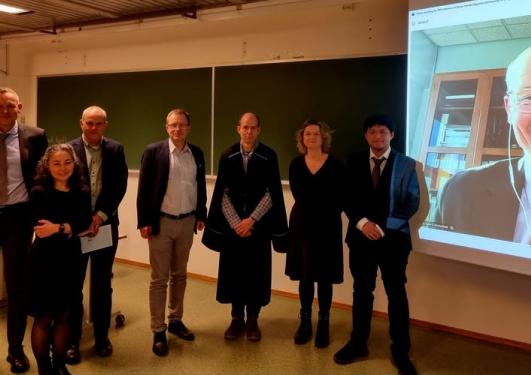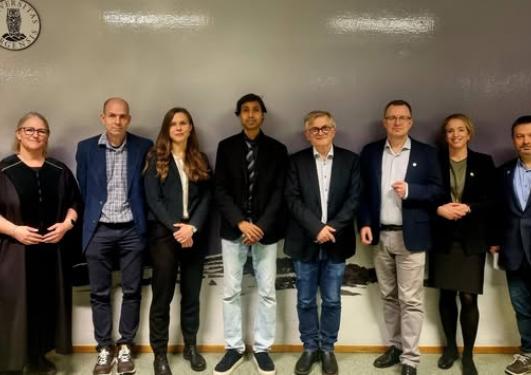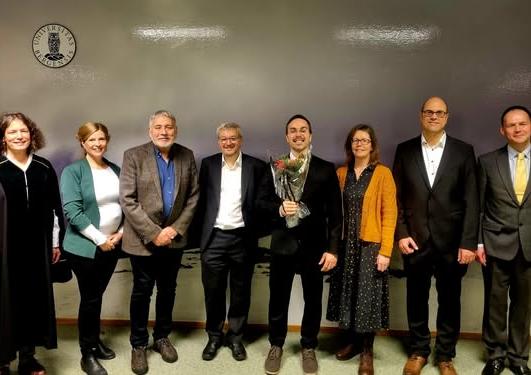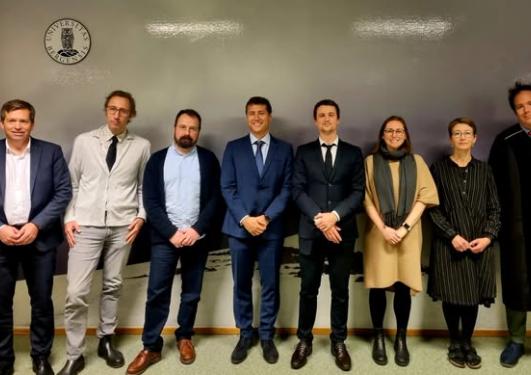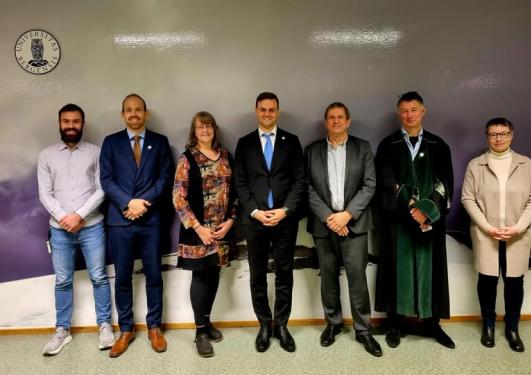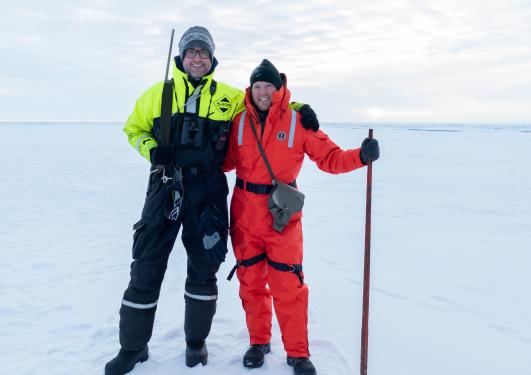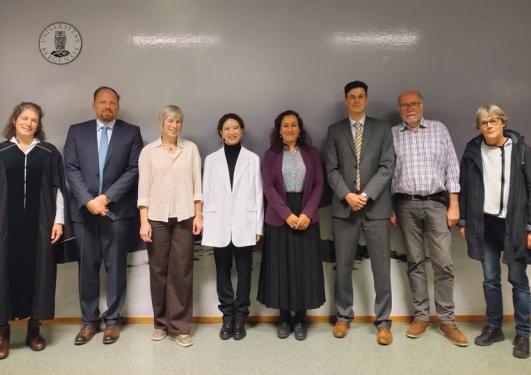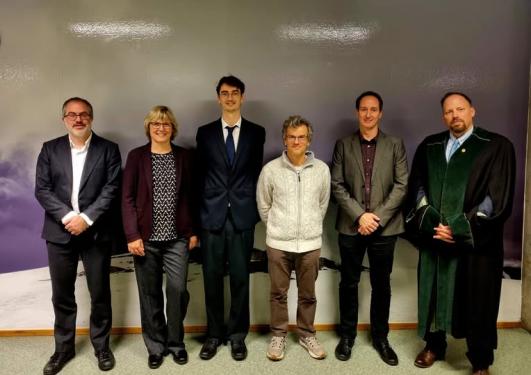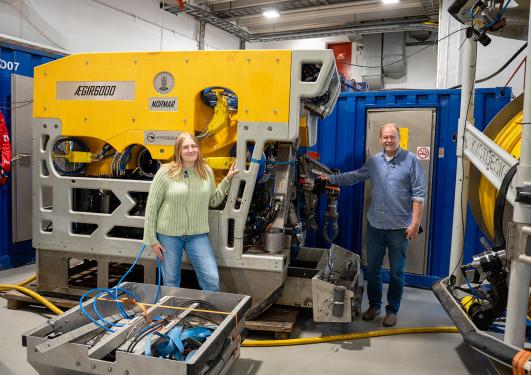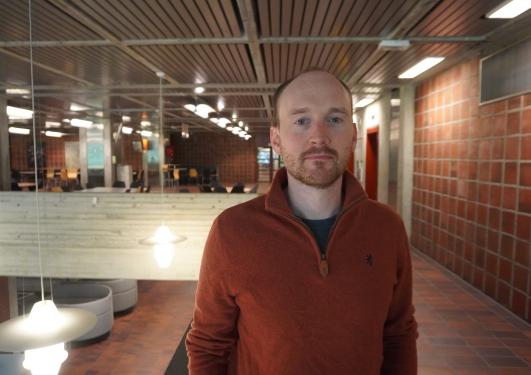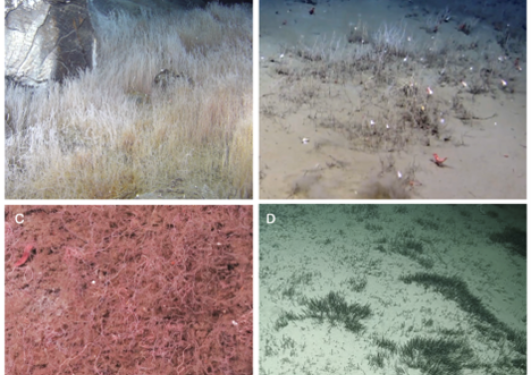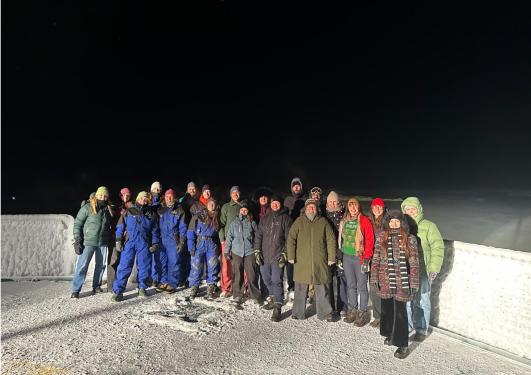News archive for Department of Earth Science
Tuesday 13. January 2026 Durra Handri Saputera defended the PhD thesis: "3D Integral Equation Modelling and Inversion of Induction Logging Data".
Thursday 18. December 2025 Ujjwal Shekhar defended his PhD thesis "Microseismic source characterization in fractured anisotropic media using elastic waveform inversion".
Monday 15. December 2025 Karl Guy Romeo Purcell defended his PhD thesis "Reconstructions of southern South Africa hydroclimate during the last glacial cycle, and potential linkages to human behavioural development".
Wednesday 10. December 2025 Johannes Hardeng defended his PhD thesis "Floods and avalanches in a changing climate: Reconstructing frequency and seasonality from lacustrine records in southern Norway".
Friday 14. November 2025 MSc Hakan Heggernes defended his PhD thesis "Deformation structures in porous sandstone: Network properties and influence on fluid flow".
A few years ago, scientists from the University of Bergen, for the first time in history, managed to collect samples from one of the most remote and extreme seafloor environments deep under the Arctic ice. Now, their first findings reveal extreme hot springs, fragile metal-rich chimney structures, and enormous hydrogen release that could be crucial for the search for life in our Solar System.
On Friday 10. October 2025 MSc. Wanyee Wong defended her PhD thesis: «Sea ice in the Nordic Seas during Dansgaard-Oeschger events»
On Friday 24. October 2025 MSc. Daniel Francis James Gunning defended his PhD thesis «Modelling the Pleistocene Climate Cycles: Assessing the Roles of Precession and Obliquity»
Now the University of Bergen wants to uncover the secrets of the dark ocean, by establishing a national centre for deep-sea innovation.
PhD-candidate Nina Hećej wants to know more about where, when, how and why landslides in Norway occur. With the consequences of climate change, more knowledge on future landslides can potentially save both infrastructure and lives.
“There hasn’t been much focus on the fact that coastlines are dynamic,” says a researcher at the University of Bergen.
The start of the year marked the launch of WormFEST — a groundbreaking project exploring the fascinating worm forests found deep underwater near Arctic hydrothermal vents and cold seeps.
The University of Bergen (UiB) will host another seven international research fellows after a very successful application round in this year’s competition for MSCA funding from the EU. The grants will fund the researchers' stay at UiB for two years.
Rogue or freak waves (monster waves) are exceptionally large waves that can suddenly loom into existence, seemingly from nowhere. Are these waves truly different from ordinary storm waves, or are they just what you should expect to see if you wait long enough?
In collaboration, five researchers from several research institutions in Bergen have succeeded in attracting the largest international conference in deep-sea biology to Bergen in 2028. The team will jointly organize the conference, supported by local professional network Bergen Bathysphere.
The CDeepSea Ultima Thule expedition on the R/V Kronprins Haakon left Longyearbyen on November 26, 2024 with the primary objective of mapping and sampling in the Lena Trough. However, the researchers and crew onboard were prepared for challenging sea ice conditions given the time of year and the northern latitudes... and that is what they encountered!
On the beautiful island of Milos (Greece), a recent field course offered CDeepSea students a unique opportunity to dive deep into the world of mineral deposits and hydrothermal systems. With an impressive ratio of 8 instructors to 14 students, the participants received training on a wide variety of topics relevant for minerals and mineral exploration, from economic geology and geochemistry to... Read more
First-year students in the Bachelor’s program in Earth Science and Informatics got hands-on experience with drone-flying while enjoying the magnificent scenery from the top of Bergen.
Pages
- January 2026 (1)
- December 2025 (3)
- November 2025 (1)
- October 2025 (4)
- September 2025 (1)
- August 2025 (1)
- February 2025 (3)
- January 2025 (1)
- December 2024 (1)
- November 2024 (1)
- October 2024 (3)
- September 2024 (4)
- August 2024 (2)
- July 2024 (3)
- June 2024 (2)
- April 2024 (3)
- March 2024 (1)
- February 2024 (2)
- December 2023 (2)
- November 2023 (4)
- October 2023 (2)
- September 2023 (1)
- August 2023 (3)
- July 2023 (4)
- June 2023 (1)
- April 2023 (4)
- March 2023 (2)
- February 2023 (1)
- January 2023 (2)
- December 2022 (1)
- November 2022 (8)
- October 2022 (1)
- August 2022 (2)
- June 2022 (6)
- May 2022 (1)
- April 2022 (1)
- March 2022 (3)
- February 2022 (2)
- December 2021 (2)
- November 2021 (2)
- October 2021 (1)
- September 2021 (2)
- July 2021 (1)
- June 2021 (9)
- May 2021 (1)
- February 2021 (1)
- September 2020 (2)
- June 2020 (2)
- May 2020 (1)
- April 2020 (2)
- November 2019 (1)
- October 2019 (1)
- April 2019 (1)
- February 2019 (4)
- January 2019 (2)
- December 2018 (1)
- October 2018 (6)
- June 2018 (3)
- March 2018 (1)
- February 2018 (1)
- January 2018 (2)
- December 2017 (2)
- November 2017 (4)
- October 2017 (3)
- September 2017 (1)
- July 2017 (1)
- May 2017 (1)
- March 2017 (1)
- February 2017 (1)
- January 2017 (2)
- December 2016 (1)
- November 2016 (1)
- October 2016 (2)
- September 2016 (2)
- August 2016 (1)
- June 2016 (3)
- May 2016 (3)
- April 2016 (1)
- March 2016 (1)
- January 2016 (1)
- November 2015 (2)
- October 2015 (3)
- June 2015 (2)
- May 2015 (1)
- March 2015 (1)
- February 2015 (1)
- November 2014 (1)
- October 2014 (4)
- May 2014 (2)
- March 2014 (1)
- January 2014 (1)
- December 2013 (4)
- November 2013 (1)
- October 2013 (5)
- August 2013 (1)
- June 2013 (1)
- May 2013 (2)
- April 2013 (2)
- February 2013 (1)
- January 2013 (3)
- December 2012 (1)
- October 2012 (1)
- September 2012 (1)
- August 2012 (1)
- March 2012 (1)
- January 2012 (1)
- December 2011 (2)
- November 2011 (5)
- October 2011 (4)
- September 2011 (6)
- July 2011 (3)
- June 2011 (6)
- May 2011 (4)
- April 2011 (2)
- March 2011 (5)
- February 2011 (2)
- January 2011 (1)
- December 2010 (2)
- November 2010 (3)
- October 2010 (2)
- September 2010 (1)
- June 2010 (4)
- May 2010 (2)
- April 2010 (3)
- March 2010 (3)
- February 2010 (3)
- January 2010 (3)
- September 2009 (1)
- August 2009 (2)
- July 2009 (1)
- June 2009 (4)
- March 2009 (2)
- February 2009 (1)
- January 2009 (1)
